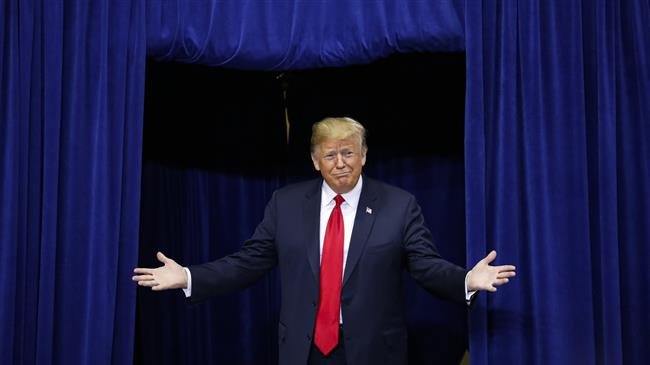27, September 2019
US: Trump abused office, forced White House to cover it up 0
The whistleblower complaint at the heart of the burgeoning controversy over President Donald Trump’s call with the Ukrainian president claims not only that Trump misused his office for personal gain and endangered national security, but that unidentified White House officials tried to keep it a secret even within the government.
In seven stark, carefully worded pages, the unidentified whistleblower alleged the commander in chief pushed his foreign counterpart to investigate Democratic presidential contender Joe Biden and his son Hunter Biden, and that senior White House officials then tried to “lock down” records related to the matter.
The pressure, the whistleblower alleged, came in a phone call July 25 between Trump and President Volodymyr Zelensky of Ukraine, an exchange that turned so politically problematic that White House lawyers directed other officials to remove the electronic transcript of the conversation from the computer system where it was stored.
The transcript, the whistleblower alleged, was then loaded onto a separate system meant for highly classified information. And according to White House officials who informed the whistleblower, that was “not the first time” a transcript was put there due to concerns about politics rather than national security, the complaint alleged.
Trump, the whistleblower wrote, was “using the power of his office to solicit interference from a foreign country in the 2020 U.S. election.”
The whistleblower’s assertions — made public Thursday after House Intelligence Committee Chairman Rep. Adam B. Schiff (D-Calif.) released the person’s complaint — fueled an already intense political battle that this week led congressional Democrats to formally launch an inquiry into whether Trump should be impeached.
At a hearing to question Trump’s acting director of national intelligence, Joseph Maguire, Democrats pressed him on why he had not given them the complaint sooner, as they say the law required. Republicans attacked the reliability of the whistleblower’s information as unproven hearsay.
Maguire told lawmakers he believed the whistleblower had acted “in good faith,” but declined to offer any conclusion about the allegations.
House Speaker Nancy Pelosi (D-Calif.) read portions of the complaint to reporters Thursday, declaring: “This is a coverup.”
Trump lashed out publicly and privately against the accusations. At a closed-door event in New York to thank U.S. personnel who had worked on Trump’s visit to the United Nations General Assembly, the president suggested darkly that the people who spoke about his conversation with Zelensky should be viewed as traitors.
“I want to know who’s the person, who’s the person who gave the whistleblower the information? Because that’s close to a spy,” he said in a recording of the remarks obtained by the Los Angeles Times. “You know what we used to do in the old days when we were smart? Right? The spies and treason, we used to handle it a little differently than we do now.”
(Source: The Washington Post)































28, September 2019
EU threatens to withdraw from JCPOA 0
European leaders have threatened to start withdrawing from the Iran nuclear deal in November if Tehran does not return to full compliance.
President Donald Trump withdrew the US from the Joint Comprehensive Plan of Action (JCPOA) in May 2018, and has since reinstated old sanctions and imposed new ones on Tehran in the hope of crippling its economy and forcing it into falling in line.
Since then, Europe says it has strived to preserve the deal, setting up a financial mechanism called INSTEX to help Iran circumvent US sanctions. But in reality not much has been achieved. Trade with Iran has not surged via INSTEX, and Europe has not stood up to the US over its illegal sanctions and unceremonious withdrawal from the historic deal. And yet Iran is the signatory being asked to cooperate.
Three separate steps have been taken so far by Iran and the fourth is scheduled for November. Tehran wants the US sanctions to be lifted, but as pressure on the Iranian people increases with inflation skyrocketing and vital goods and medicines becoming increasingly scarce, the government is losing patience.
This past week European leaders tried to orchestrate a meeting between Trump and Rouhani at the UN General Assembly. Macron told Rouhani it was an opportunity he shouldn’t miss, but Iran’s president was candid.
So no talks on any level until all US sanctions are lifted. During and after the UN general assembly Europe’s tone became increasingly aggressive towards Tehran. The JCPOA’s European trio blamed Iran for the attacks on Saudi oil refineries and threatened to withdraw from the nuclear deal in November if Iran did not return to full compliance.
Source: Presstv